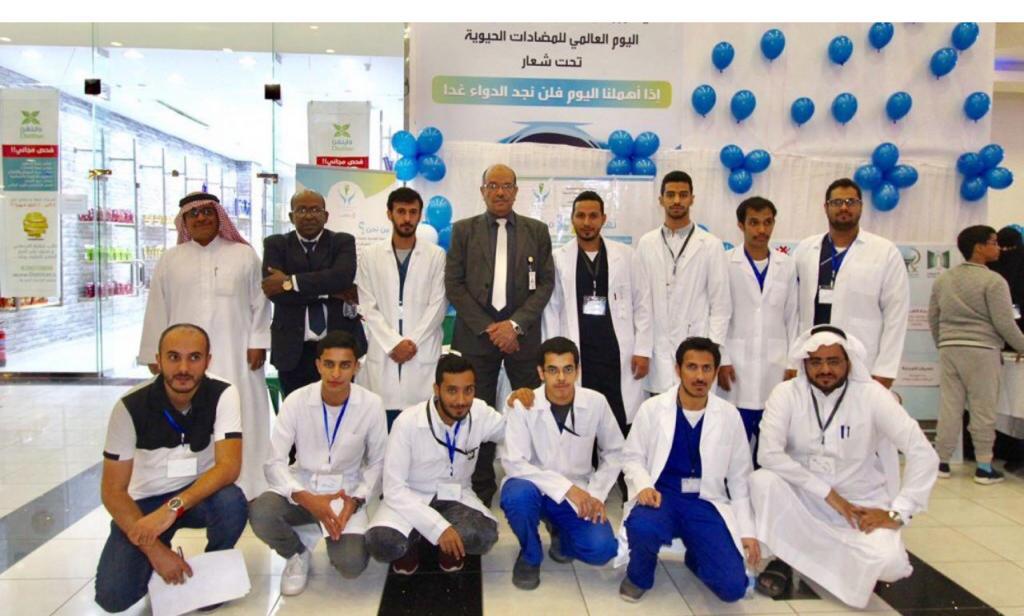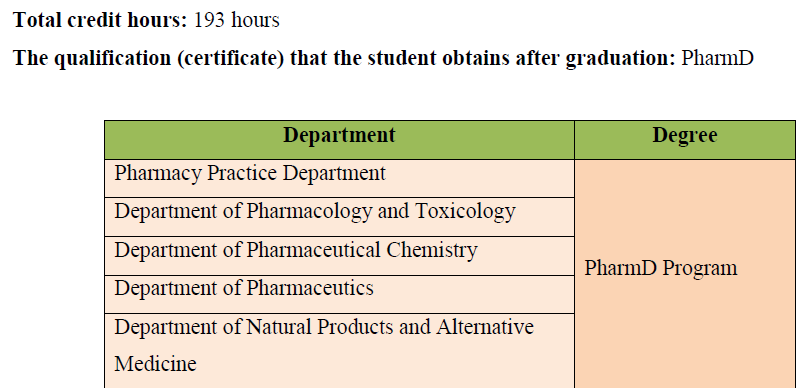Mission of PharmD Program 
Preparing a pharmacist with high efficiency and skills to serve the community in various fields of the pharmacy profession.
Program Goals
1. Preparing highly qualified pharmacists who are able to work and communicate effectively with the medical team within public and private hospitals.
2. Qualifying the graduate to provide comprehensive pharmaceutical care services to patients in hospitals and community pharmacies.
3. Provide the graduate with the skills and competencies necessary to educate patients and society regarding the safe and effective use of the drug to improve their quality of life.
4. Prepare qualified graduates with the necessary skills to conduct clinical research.
5. Providing the community with qualified pharmacists to work in pharmaceutical factories and monitor drug quality.
6. Qualifying graduates to abide by the code of conduct used in the practice of the pharmacy profession.
7. Qualifying graduates to have the ability to continue self-learning in the field of practicing the pharmacy profession.
Fields of work for graduates of the program
A pharmacist with a PharmD degree can work in different sectors, the most important of which are:
1. Pharmacies: government and private, hospital pharmacies, and corporate pharmacies.
2. Drug and Toxicological Information Centers.
3. Drug analysis laboratories, food and water analysis laboratories, poison detection and treatment laboratories, analysis and quality control, Food and Drug General Authority.
4. Pharmaceutical manufacturing.
5. Scientific offices of pharmaceutical companies.
6. Pharmaceutical and pharmacological research.
7. Works of a technical administrative nature (eg: the Saudi Commission for Health Specialties).
8. Academic field (a faculty member at the university).

Attributes of Graduates of Pharm.D program
1. Qualified graduate.
2. Adopt recent technology perfectly.
3.Communicate efficiently.
4. Aware of ethical, cultural and religious issues.
5. Behave responsibly.
6. Work professionally.
PharmD Program learning outcomes
Knowledge and Understanding
K1. Demonstrate in depth the foundation of biological, pharmaceutical and biomedical sciences in relation to supporting health and wellness.
K2. Demonstrate a comprehensive knowledge of different drug sources, physical and chemical properties, purification, analytical methods, pharmacological classes and actions, toxicity and abuse for different types of medications, natural remedies and other therapies for the prevention and treatment.
K3. Demonstrate different types of design, manufacture, delivery, evaluation, quality assurance, dosage calculation, bioavailability and pharmacokinetics of different drug dosage forms.
K4. Demonstrate the concepts and principles of medicines management and clarify the therapeutic plan, outcomes and monitoring parameters in various pharmacy practice settings and different types of patient-centered care and population-based care.
K5. Demonstrate the role of pharmacists in aspects of pharmacy-care according to legal, ethical and professional standards in promoting health as well as prevention and treatment.
Skills
S1. Integrate pharmaceutical sciences with pharmacy applications according to legal, ethical, social, economic and professional guidelines.
S2. Engage in inter-professional healthcare education activities.
S3. Evaluate scientific and professional literature critically to be utilized in evidence-based practice and problem solving.
S4. Apply basic drug development skills in relevant setting.
S5. Utilize effectively appropriate information technologies to optimize medication use and patient care.
S6. Contribute to decision making processes by providing accurate and relevant recommendations in various settings.
S7. Interpret information obtained from different resources to provide creative solutions for complex problems.
S8. Communicate clearly and effectively with healthcare professionals, patients, caregivers, administrative and supportive personnel and the public in various settings.
S9. Construct numerical calculations, patients-centered and evidence-based pharmaceutical care plans.
S10. Perform professionally in drug analysis, evaluation and pharmaceutical dosage form design and preparation.
Values
V1. Demonstrate leadership skills, accountability and acceptance of responsibility within a team in various professional settings.
V2. Plan effective time management schedules, independent thinking and adaptation to changes or unanticipated circumstances.

